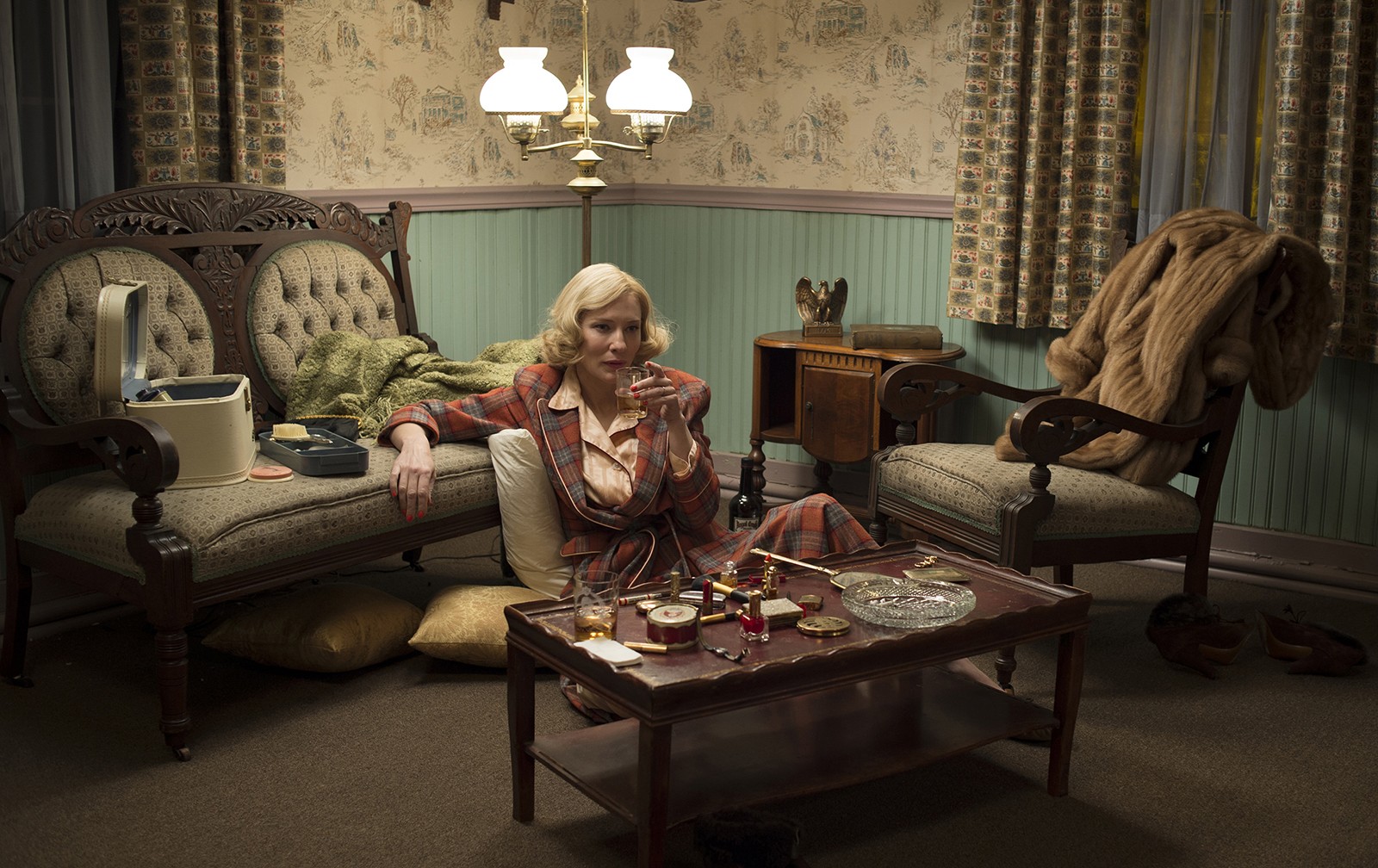
Ralph Rainger and Leo Robin's sweet nectarine of a jazz standard “Easy Living” figures, in a glancing yet potent way, in Todd Haynes's Carol, adapted from Patricia Highsmith's 1952 novel The Price of Salt. Even though the lyrics speak of contentment—”Living for you is easy living/It's easy to live when you're in love”—the melody has a wistful glow about it, a suggestion that while there's no such thing as living easy, the dream of doing so is very real. It's the perfect song, then, for a story about two women who defy the rules of society by falling in love, a story that takes place—and was written—in an era when unions like this one needed to be kept exceptionally discreet. In Carol, “Easy Living” is more than a song; it's refuge from the world, a honeymoon cottage built for two. And it's a touch of warmth in a piece of filmmaking that, while beautifully modulated, is also as smooth and cool as marble.
Cate Blanchett's Carol is a suburban New Jersey housewife and mother seeking a divorce from husband Harge (Kyle Chandler, superb as always), one of those classic 1950s providers: He's solid and reliable, but he's given his heart to a woman he just can't understand. Carol has had a previous affair with a woman who is now just a friend (Sarah Paulson's Abby), and Harge knows about it: That knowledge hangs between them like a piece of poison fruit in a fairy tale—when the two argue, Harge can't resist biting into that particular plum from Carol's past, and its bitterness fills them both with anguish. He can't let her go; she's aching to go. They've been honest with each other, as couples need to be, but the truth has come nowhere close to setting them free.
The further complication for Carol—though it's also, as all new love affairs are, a source of wonder—is that she has met Rooney Mara's Therese, a New York department store clerk who's striving to become a photographer. They first see each other when Carol, wearing a mink coat the color of clover honey, swirls into the toy department where Therese has been stationed. Therese is a slip of a thing with a cautious hyphen of a smile; in the line of duty, she's been forced to wear an unfortunate Santa hat. Therese stares in disbelief—a kind of suspended animation—when Carol drifts into view. She's like a waft of perfume with a woman attached.

The affair barely begins as a friendship: Carol is quietly predatory, not in a deceitful way, but in the manner of a woman who has been kept too long from everything she desires. Therese, with her too-short, fringy bangs and anxious brown eyes, is slightly awkward, but she's also alert and intelligent—you immediately get the sense that she could be Carol's undoing, rather than the other way around. And both are possessed of an almost unreal beauty. As shot by Haynes's frequent (and great) cinematographer, Ed Lachman, their faces have a gorgeous but slightly unnatural glow—they look like softly painted store mannequin heads, believably lifelike yet hardly like people you see every day.
Carol gives the appearance of having been constructed without seams or joints; its plot doesn't so much move forward as drift. In a striking sequence, dreamlike to an almost David Lynchian degree, Carol drives Therese out to her lavish suburban home: Just as the lights of the tunnel around them are a filmy blur, their faces also become diaphanous and abstract. This, sometimes, is just what falling in love is like. In its melodramatic scope, Carol makes a fine companion piece to Haynes's superb 2002 Far From Heaven: Both movies are about Fifties marriages that are built on nothing so clean-cut as a lie; rather, they're about individuals who have strained to be something they're not, not just as a way of avoiding scorn or shame, but to keep families together and to avoid causing pain to people they love. But Carol is a much cooler picture. Its emotions run deep beneath the surface, not close to the top like easily skimmable cream. Highsmith is a chilly writer, and Haynes is a warm filmmaker: Maybe the tension between their styles is what makes Carol both compelling and elusive. When the film played last spring in Cannes, it drew rapturous responses from some critics. For me, it's a movie that's easy to admire but hard to hold close.
There are a few elements, though, that are beyond irresistible, like Judy Becker's gorgeous production design (Carol's car is a creamy silver-taupe Packard, a chariot to swoon over) and Carter Burwell's tremulously sentient score, a wintry sky-wash of woodwinds and French horns. And don't even get me started on the clothes, by Sandy Powell, who knows the secret power of pearl-gray wool paired with soft coral silk, or of a tomato-soup-colored tartan dressing gown. Carol is a film you want to reach out and touch, if only you could reach anywhere near the top of the pedestal it's perched on. It is itself an unattainable love object, the goddess Venus disguised as a movie.

